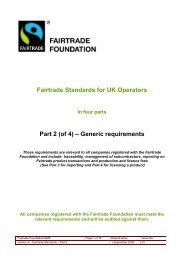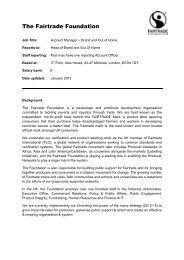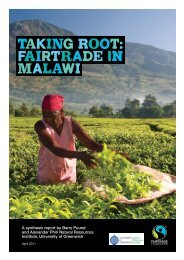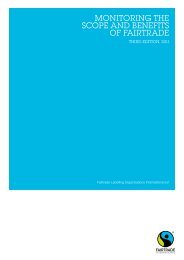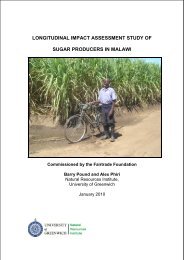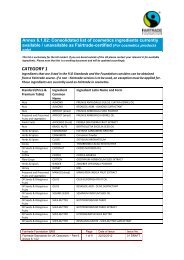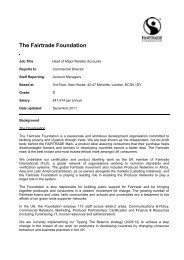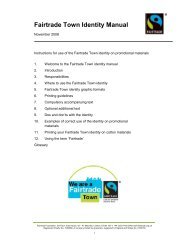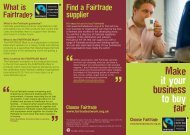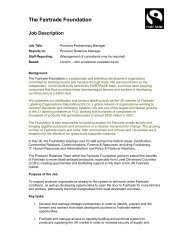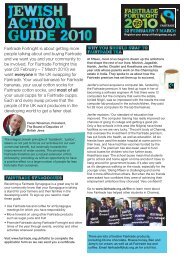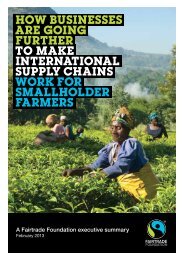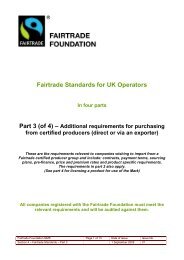Fairtrade and Coffee Report 2012 - The Fairtrade Foundation
Fairtrade and Coffee Report 2012 - The Fairtrade Foundation
Fairtrade and Coffee Report 2012 - The Fairtrade Foundation
You also want an ePaper? Increase the reach of your titles
YUMPU automatically turns print PDFs into web optimized ePapers that Google loves.
2.3 <strong>The</strong> coffee supply chain: who wields the power?<br />
<strong>Coffee</strong> supply chains are often complex, with beans sometimes changing h<strong>and</strong>s dozens of times on the journey<br />
from producer to consumer. Small farmers typically sell their coffee beans to local traders, often agents for big<br />
coffee millers <strong>and</strong> exporters, who transport the coffee to the processing plant. After processing, the coffee is sold<br />
by a local exporter to an international trader, from whom roasting companies then usually purchase the coffee<br />
<strong>and</strong> sell it to retailers, notably supermarkets, before finally reaching consumers. 21 Primary or village co-operatives<br />
purchase members’ coffee <strong>and</strong> sell it in bulk to a processor or exporter, while regional co-operative unions<br />
purchase, process <strong>and</strong> export coffee on behalf of their member co-operatives.<br />
Figure 7: Simplified coffee supply chain<br />
Farmer<br />
Private trader<br />
Processing plant<br />
Local exporter<br />
Roasting company<br />
Retailer/Catering<br />
Consumer<br />
Co-operative<br />
(own processing plant)<br />
Trader/Importer<br />
<strong>The</strong> value of the global coffee market, including fresh <strong>and</strong> instant, grew 17.5 per cent to reach $70.86bn in 2011, 22<br />
while the UK retail coffee market was worth £831m in 2010. 23 <strong>The</strong> coffee supply chain has long been dominated by<br />
a small number of multinational trading <strong>and</strong> roasting companies:<br />
• Four companies – ECOM, Louis Dreyfus, Neumann <strong>and</strong> VOLCAFE – control around 40 per cent of global<br />
coffee trade. 24 <strong>The</strong>y have recently been joined by Olam International which describes itself as one of the largest<br />
suppliers of robusta coffee in the world. 25<br />
• As for roasters <strong>and</strong> marketers, five corporations – Kraft, Nestlé, Sara Lee, Proctor & Gamble <strong>and</strong> Tchibo – control<br />
around half the global market. 26<br />
• Nestlé dominates instant coffee with a market share of over 50% globally. 27 During 2006-08 Nestlé sold over<br />
£17bn worth of instant coffee worldwide, led by its ‘billionaire br<strong>and</strong>’, Nescafe. 28<br />
• In the UK Nestlé (42%), Kraft (19%) <strong>and</strong> Douwe Egberts (7%) account for 68% of the retail coffee market, with<br />
supermarket own-label products taking a further 17% share. 29<br />
21 Anna Milford, <strong>Coffee</strong>, cooperative <strong>and</strong> competition: <strong>The</strong> impact of <strong>Fairtrade</strong>, Chr. Michelsen Institute, 2004, p. 5<br />
22 Euromonitor, quoted in Analysis: Single-cup coffee sales seen growing, 2 February <strong>2012</strong> www.reuters.com<br />
23 <strong>Coffee</strong>, UK, April 2011, Mintel (excludes coffee consumed out of home e.g. in cafés <strong>and</strong> restaurants)<br />
24 World Bank, World development report 2008, 2007, p. 136. In 1998, the two largest coffee traders (Neumann <strong>and</strong> VOLCAFE) controlled 29 per cent of<br />
the market <strong>and</strong> the top six companies controlled 50 per cent. After a series of company mergers, by the early 2000s, the top three groups controlled<br />
around 45 per cent; Agritrade, Executive brief: <strong>Coffee</strong>, September 2008, p. 8.<br />
25 www.olamonline.com/aboutus/businessmodel.asp<br />
26 Figures reported by sources vary. <strong>The</strong> World Bank notes that the four largest roasters control 45 per cent of the market; World development report<br />
2008, 2007, p. 136. Other analysts write that two corporations, Kraft <strong>and</strong> Nestle, control 49 per cent of the roasting industry; the top five corporations<br />
control 69 per cent; Benoit Daviron <strong>and</strong> Stefano Ponte, <strong>The</strong> coffee paradox: Global markets, commodity trade <strong>and</strong> the elusive promise of development,<br />
Zed, London, 2005<br />
27 Agritrade, Executive brief: <strong>Coffee</strong>, September 2008, p. 8<br />
28 Nestle management report, 2008, p. 72, www.nestle.com<br />
29 Leatherhead Food Research, <strong>The</strong> UK Food & Drinks <strong>Report</strong> 2009, October 2009<br />
10 <strong>Fairtrade</strong> <strong>and</strong> <strong>Coffee</strong>



